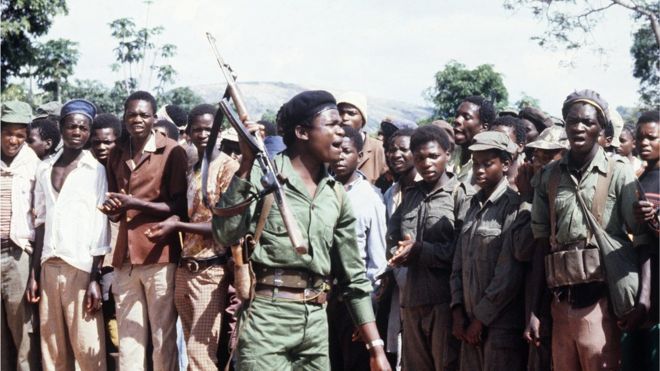 AFP
AFP
It has been an open secret in Zimbabwe for many years that Emmerson Mnangagwa would like to succeed Robert Mugabe as president.
And Mr Mugabe has been almost toying with his emotions - one day promoting him to senior positions in both the ruling Zanu-PF party and the government, raising speculation that Mr Mnangagwa was the "heir apparent", but later demoting him after he possibly displayed his ambitions a bit too openly.
But after his latest sacking, it looks as though the patience of the man known as "the crocodile" has finally snapped.
After the president dismissed him and publicly accused him of "treachery", his supporters in the security forces where he made his name intervened on his behalf.
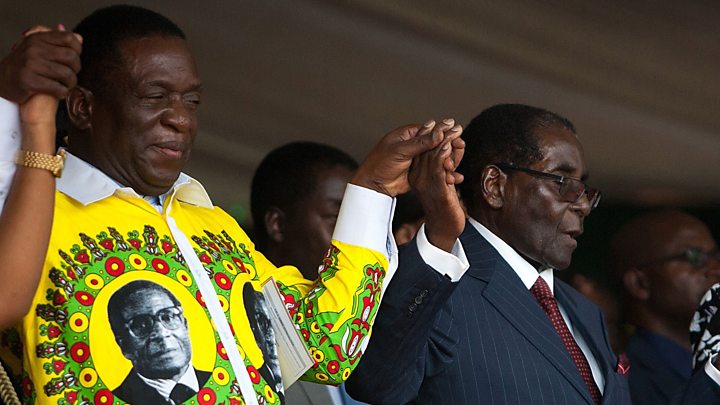
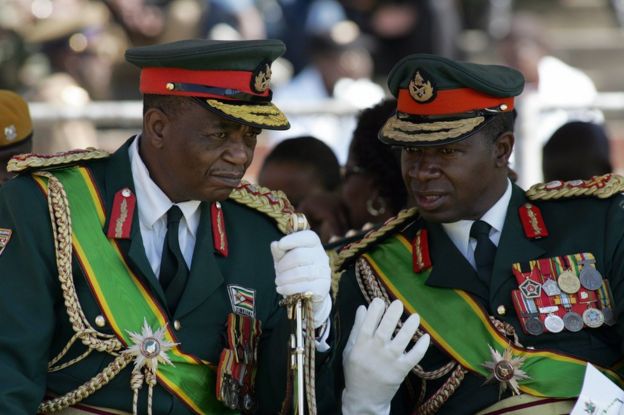 AFP
AFP
He helped direct Zimbabwe's 1970s war of independence and later became the country's spymaster during the 1980s civil conflict, in which thousands of civilians were killed.
He has denied any role in the massacres, blaming the army.
But anyone hoping that a Mnangagwa presidency would see an end to human rights abuses in Zimbabwe could be mistaken. His critics say the 71-year-old has blood on his hands.
He is known as "the crocodile" because this is the totem of his clan, but it certainly fits him well. As a result, his supporters are known as "Lacoste".
Who is Emmerson Mnangagwa?
- Known as "the crocodile" because this is the totem of his clan. His supporters are known as "Lacoste"
- Received military training in China and Egypt
- Tortured by Rhodesian forces after his "crocodile gang" staged attacks
- Helped direct Zimbabwe's 1970s war of independence
- Became the country's spymaster during the 1980s civil conflict, in which thousands of civilians were killed
- Seen as key link between army, intelligence agencies and Zanu-PF party
- Accused of masterminding attacks on opposition supporters after 2008 election
Those who fought in the 1970s war, like Mr Mnangagwa, have long monopolised power in Zimbabwe.
Afraid that they would lose their positions if Grace Mugabe were to succeed her husband, as seemed to be on the cards, they intervened.
When his close ally, Gen Constantino Chiwenga, warned against the "purging which is clearly targeting members of the party with a liberation background", it was obviously a reference to Mr Mnangagwa's sacking.
"When it comes to matters of protecting our revolution, the military will not hesitate to step in," he warned, a threat which has now been carried out.
Congo connection
Mr Mnangagwa was born in the central region of Zvishavane and is from the Karanga sub-group of Zimbabwe's majority Shona community.
The Karangas are the largest Shona group and some feel it is their turn for power, following 37 years of domination by Mr Mugabe's Zezuru group.
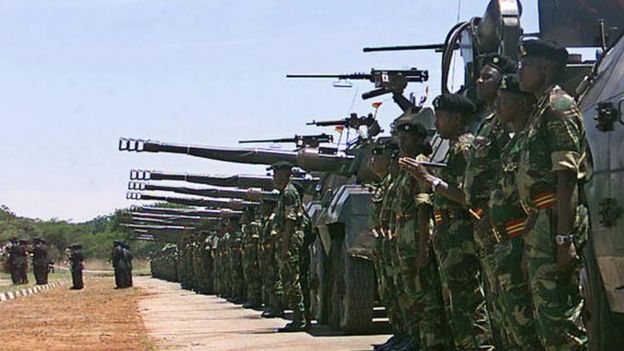 GETTY IMAGES
GETTY IMAGES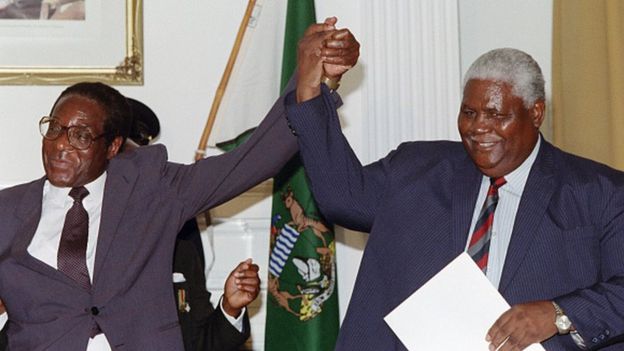 GETTY IMAGES
GETTY IMAGES
According to a United Nations report in 2001, Mr Mnangagwa was seen as "the architect of the commercial activities of Zanu-PF".
This largely related to the operations of the Zimbabwean army and businessmen in the Democratic Republic of Congo.
Zimbabwean troops intervened in the DR Congo conflict on the side of the government and, like those of other countries, were accused of using the conflict to loot some of its rich natural resources such as diamonds, gold and other minerals.
But despite his moneyraising role, Mr Mnangagwa, a lawyer who grew up in Zambia, is not well-loved by the rank and file of his own party.
One veteran of Zimbabwe's war of independence, who worked with him for many years, put it simply: "He's a very cruel man, very cruel."
Another Zanu-PF official posed an interesting question when asked about Mr Mnangagwa's prospects: "You think Mugabe is bad but have you thought that whoever comes after him could be even worse?"
The opposition candidate who defeated Mr Mnangagwa in the 2000 parliamentary campaign in Kwekwe Central, Blessing Chebundo, would also agree that his rival is not a man of peace.
During a bitter campaign, Mr Chebundo escaped death by a whisker when the Zanu-PF youths who had abducted him and doused him with petrol were unable to light a match.
Atrocities
Mr Mnangagwa's fearsome reputation was made during the civil war which broke out in the 1980s between Mr Mugabe's Zanu party and the Zapu of Joshua Nkomo.
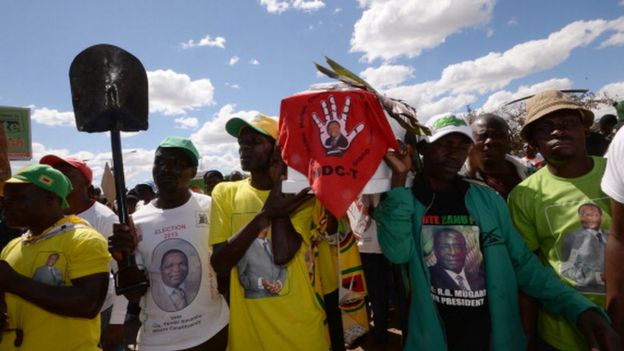 GETTY IMAGES
GETTY IMAGES
As National Security Minister, Mr Mnangagwa was in charge of the Central Intelligence Organisation (CIO), which worked hand in glove with the army to suppress Zapu.
Thousands of innocent civilians - mainly ethnic Ndebeles, seen as Zapu supporters - were killed before the two parties merged to form Zanu-PF.
Among countless other atrocities, villagers were forced at gunpoint to dance on the freshly-dug graves of their relatives and chant pro-Mugabe slogans.
Despite the 1987 Unity Accord, the wounds are still painful and many party officials, not to mention voters, in Matabeleland would be reluctant to support a Mnangagwa presidency.
Trained in China
Mr Mnangagwa, though, does enjoy the support of many of the war veterans who led the campaign of violence against the white farmers and the opposition from 2000.
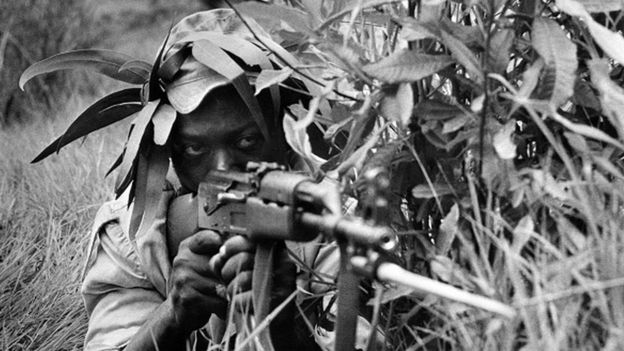 GETTY IMAGES
GETTY IMAGES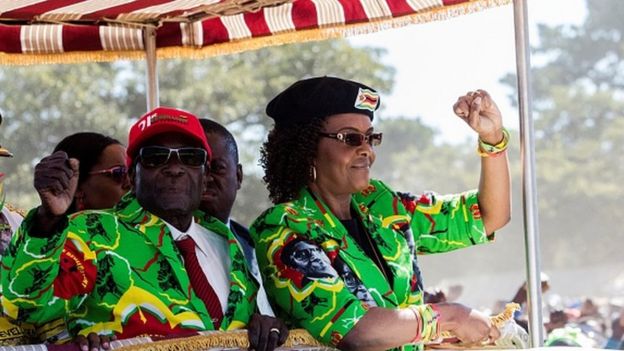 GETTY IMAGES
GETTY IMAGES
They remember him as one of the men who, following his military training in China and Egypt, directed the 1970s fight for independence.
He also attended the Beijing School of Ideology, run by the Chinese Communist Party.
Mr Mnangagwa's official profile says he was the victim of state violence after being arrested by the white-minority government in the former Rhodesia in 1965, when the "crocodile gang" he led helped blow up a train near Fort Victoria (now Masvingo).
"He was tortured, severely resulting in him losing his sense of hearing in one ear," the profile says.
"Part of the torture techniques involved being hanged with his feet on the ceiling and the head down. The severity of the torture made him unconscious for days."
As he was under 21 at the time, he was not executed but instead sentenced to 10 years in prison.
"He has scars of that period. He was young and brave," a close friend of Mr Mnangagwa once said, asking not to be named.
"Perhaps that explains why he is indifferent. Horrible things happened to him when he was young."
Ice cream plot
His previous demotion came in 2005, when he lost his post as Zanu-PF secretary for administration, which had enabled him to place his supporters in key party positions.
This followed reports that Mr Mnangagwa had been campaigning too hard for the post of vice-president.
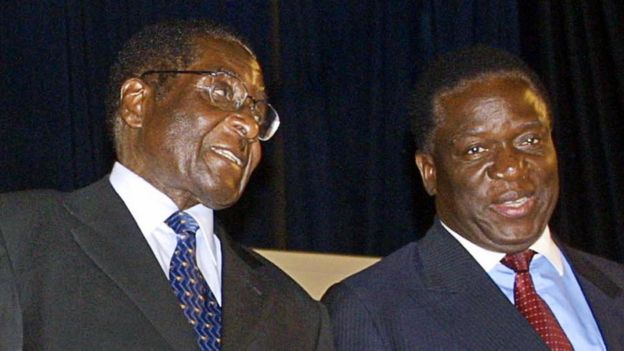 AFP
AFP
But after Mr Mugabe lost the first round of the presidential election to his long-time rival Morgan Tsvangirai in 2008, Mr Mnangagwa was rumoured to have masterminded Zanu-PF's political campaign, co-ordinating the party's links with both army and intelligence.
The military and state security organisations unleashed a campaign of violence against opposition supporters, leaving hundreds dead and forcing thousands from their homes.
Mr Tsvangirai then pulled out of the second round and Mr Mugabe was re-elected.
Mr Mnangagwa has not commented on allegations he was involved in planning the violence.
But an insider in the party's security department later confirmed that Mr Mnangagwa was the political link between the army, intelligence and Zanu-PF.
"He cuts party finance deals, organises the campaign that links both security and party. He has Mugabe's ear on everything."
That has obviously changed now.
His rivalry with Grace Mugabe took a bizarre turn earlier this year when he fell ill in August at a political rally led by President Mugabe and had to be airlifted to South Africa.
His supporters suggested that a rival group within Zanu-PF had poisoned him and appeared to blame ice cream from Mrs Mugabe's dairy firm.
But it appears as though by taking on Mr Mnangagwa, she has bitten off more than she can chew.

No comments:
Post a Comment